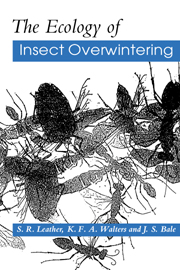5 - Costs and benefits of overwintering
Published online by Cambridge University Press: 16 September 2009
Summary
Introduction
The statement above explains to some extent, the facts that we reveal in this chapter; that overwintering is costly in terms of survival and that the strategies used to overcome these costs by different insect species vary greatly, not only between families but within families and even within species. Moreover, it emphasises the fact that the resources used are very similar but that the way they are used is dissimilar.
When discussing the costs and benefits of the overwintering habit it must be remembered that we are looking at the subject from two slightly different viewpoints. First, we are comparing the overwintering habit, i.e. the ways in which winters are passed, of temperate insects with that of tropical insects, which do not have a dormant phase. Secondly, we compare those insects from temperate climates that do possess a dormant phase with those that do not. Within this category we are also comparing the different overwintering stages of those insects that have opted for a mixed strategy option, i.e. where two or more different overwintering forms are present not only in the same species but in the same location. By adopting these different viewpoints we are able to discuss the advantages and disadvantages of overwintering in the one chapter.
Developmental stage and overwintering success
Insects can pass the winter in a number of different stages – egg, larva, adult and pupa – in fact every stage of the life cycle is used by some species of insect in which to overwinter.
- Type
- Chapter
- Information
- The Ecology of Insect Overwintering , pp. 148 - 176Publisher: Cambridge University PressPrint publication year: 1993
- 1
- Cited by



